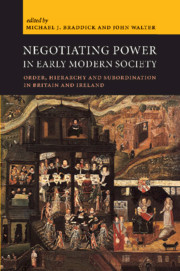Book contents
- Frontmatter
- Contents
- Notes on contributors
- Acknowledgements
- List of abbreviations and conventions
- Introduction. Grids of power: order, hierarchy and subordination in early modern society
- 1 Ordering the body: illegitimacy and female authority in seventeenth-century England
- 2 Child sexual abuse in early modern England
- 3 Sex, social relations and the law in seventeenth- and eighteenth-century London
- 4 Exhortation and entitlement: negotiating inequality in English rural communities, 1550–1650
- 5 Public transcripts, popular agency and the politics of subsistence in early modern England
- 6 ‘Bragging and daring words’: honour, property and the symbolism of the hunt in Stowe, 1590–1642
- 7 Administrative performance: the representation of political authority in early modern England
- 8 Negotiating order in early seventeenth-century Ireland
- 9 Order, orthodoxy and resistance: the ambiguous legacy of English puritanism or just how moderate was Stephen Denison?
- 10 Making orthodoxy in late Restoration England: the trials of Edmund Hickeringill, 1662–1710
- Notes
- Index
1 - Ordering the body: illegitimacy and female authority in seventeenth-century England
Published online by Cambridge University Press: 13 March 2010
- Frontmatter
- Contents
- Notes on contributors
- Acknowledgements
- List of abbreviations and conventions
- Introduction. Grids of power: order, hierarchy and subordination in early modern society
- 1 Ordering the body: illegitimacy and female authority in seventeenth-century England
- 2 Child sexual abuse in early modern England
- 3 Sex, social relations and the law in seventeenth- and eighteenth-century London
- 4 Exhortation and entitlement: negotiating inequality in English rural communities, 1550–1650
- 5 Public transcripts, popular agency and the politics of subsistence in early modern England
- 6 ‘Bragging and daring words’: honour, property and the symbolism of the hunt in Stowe, 1590–1642
- 7 Administrative performance: the representation of political authority in early modern England
- 8 Negotiating order in early seventeenth-century Ireland
- 9 Order, orthodoxy and resistance: the ambiguous legacy of English puritanism or just how moderate was Stephen Denison?
- 10 Making orthodoxy in late Restoration England: the trials of Edmund Hickeringill, 1662–1710
- Notes
- Index
Summary
Some time in the early seventeenth century, the leading parishioners of Birling, in Kent, approached their justices with a complaint. Jane Jacquett, a young woman born nearby, had given birth to an illegitimate child in their parish. That she had done so, and made them responsible for its upkeep, was – they argued – the product of a series of unfortunate circumstances, and of the malice of the neighbouring parishioners of Ryarsh, particularly its women.
The petition traced Jane Jacquett's history from service to orphan-hood and illegitimate motherhood. Jane, once a covenant servant in Ryarsh, was subsequently employed by the parish to nurse her family with the plague; when all of the family died, and the parish (uncharitably, as the Birling petitioners said) gave her no employment, she had ended up a vagrant and turned to ‘a verie loose life’, becoming pregnant. When she went into labour she took refuge in a barn in Ryarsh. According to the petitioners of Birling
as soone as certaine of the women [of Ryarsh] had intelligence of her being ther they gott her out againe perswaded her verie Instantlie (by her owne confession) to goe to Berlinge to be delivered ther, promised allso themselves to be good and beneficiall unto her, conducted her by bywaies and fallowes in her extremitie, and lefte her in a corner of Berling to leave her loade ther, hopeing by that means the paryshe of Rairshe to be discharged of her and of the child. […]
- Type
- Chapter
- Information
- Negotiating Power in Early Modern SocietyOrder, Hierarchy and Subordination in Britain and Ireland, pp. 43 - 62Publisher: Cambridge University PressPrint publication year: 2001
- 4
- Cited by



